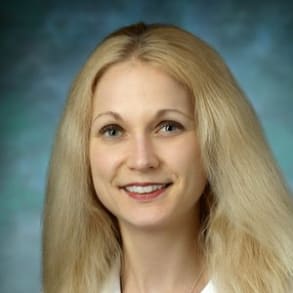Strokes are the second leading cause of death after heart disease. Neurologist Michelle Johansen discusses the global burden and commonalities between stroke and heart disease at the ends of the age spectrum: the younger and older adult.
mm Hi, I'm Michelle Johansson, an assistant professor of neurology and the cerebral vascular division at the johns Hopkins School of Medicine, an associate faculty with the Welsh Center in the Bloomberg School of Public Health. I'm here today to talk to you about one of the great sessions at the american heart association. Scientific, excessive meaning which I'm thrilled to be a part. It's entitled Euro Cardiology. Fostering collaborations between cardiology and stroke services. This is a joint session between the A. J. And the World stroke Organization. I'm a moderator for the session where speakers will talk about the importance of coordinated interaction between cardiologist and stroke physicians. I also have the privilege of specifically lecturing on the global burden of cardio, metabolic stroke and young and elderly populations talking about the commonalities between stroke and heart disease. Mm The good news is that stroke incidence prevalence and mortality declined from 1992 2017. However, stroke is still the leading cause of death worldwide after ischemic heart disease. Our only number two. When we think about the young adult, there may be a wider range of potential risk factors that need to be considered. And importantly, there are unique considerations when thinking about stroke. In the young adult. For example, these patients are in the middle of having a family. They may be at the height of their career and they may have young Children at home. Risk factors for the young adult hover do have overlapped with older adults. Specifically cardiovascular risk factors are important things like atrial fibrillation diabetes, smoking cardiovascular disease. All these things increased risk of stroke and the young adult, just like they do the older adults, an area in which I specifically do research and share some of the results during this talk include cardio metabolic stroke. Are strokes for the clots come from the heart and symbolic stroke of unknown source where it seems as if the source of the stroke, maybe the heart, but the exact cause remains unknown. The reason that figuring out the cause of the stroke is so important is that the treatment for stroke depends on the type of stroke that a patient has had right now. April fibrillation is basically the only cause of heart problem that is treated with anti coagulation. So it may be that younger adults with these symbolic strokes of unknown source. If they had specific changes in their heart would benefit from anti coagulation. We may be able to diagnose and treat more causes of stroke in the young adult. We're doing a lot of exciting research in the Johansson lab regarding stroke ideology or the cause of stroke. And I recommend that you check out our website to learn more mm The older adult with stroke struggles with disability and the absolute number of people who develop new stroke survived or remain disabled doubled over the past decade. Importantly, 80% of incident stroke burden is in low to middle-income countries. So collaborating with cardiologist in other countries and stroke neurologist is imperative. One of the things that is incredibly important to consider it. A stroke care and for cardiologist who help take care of patients with stroke are the memory problems that develop in older adults. While some may recognize that symptomatic stroke lead to cognitive decline, many do not realize that silent strokes, subclinical strokes can occur in quote unquote healthy older adults and may also lead to cognitive decline or memory problems. I present some research and results during this talk where we look at participants heart in a large epidemiology cohort study and found that people with left atrial dysfunction, which is a particular part of the heart were at increased risk of having an imaging marker of a brain change that's necessary to develop Alzheimer's dementia. Could it then be that cardiac disease might be a direct cause of brain injury? We discuss that maybe through strokes or subclinical strokes or lack of blood flow to the brain or other mechanisms. Cardiac disease might play an important role in cognitive impairment. Yeah, finally, all of this is really to draw forth the importance in working with cardiology as a stroke neurologist. I'm thrilled to be a part of the chick or any heart prevention center at johns Hopkins together, we can work together to think about patient selection for novel diagnostics, therapeutic strategies, developing guidelines and practice updates and taking care of our stroke patients. I recognize that I can't take care of a stroke patient without a cardiologist providing expertise on cardiac structure and function and that helps me do a better job diagnosed the stroke mechanism, perform a complete stroke. Work up and think about the best treatment strategies and evidence and taking care of both my young and old patients with stroke. Yeah, yeah.



